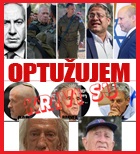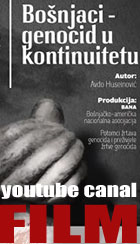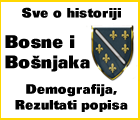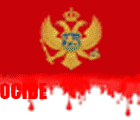Komentari
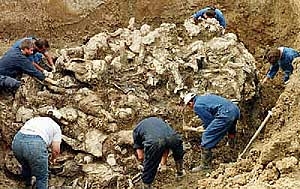
Institut za istraživanje genocida Kanada u saradnji sa Kongresom Bošnjaka Sjeverne Amerike
BOŠNJAČKE INSTITUCIJE POKREĆU NOVU KAMPANJU ZA USVAJANJE REZOLUCIJE I ZAKONA O GENOCIDU U SREBRENICI I BIH U PARLAMENTU KANADE
 Institut za istraživanje genocida Kanada u saradnji sa Kongresom Bošnjaka Sjeverne Amerike je započeo novu kampanju za usvajanje rezolucije i zakona o genocidu u Srebrenici i Bosni i Hercegovini u Parlamentu Kanade.
Institut za istraživanje genocida Kanada u saradnji sa Kongresom Bošnjaka Sjeverne Amerike je započeo novu kampanju za usvajanje rezolucije i zakona o genocidu u Srebrenici i Bosni i Hercegovini u Parlamentu Kanade. Bez obzira na pozitivne signale Vlade Kanade napisane u pismu Ministra vanjskih poslova Kanade Lawrence Cannon adresiranom na kanadsko bošnjačku zajednicu, Institut i Kongres smatraju da je Parlament Kanade jedino legalno i legitimno mjesto gdje se treba prihvatiti rezolucija i zakon o genocidu u Srebrenici i Bosni i Hercegovini, što su već davno uradili skoro svi parlamenti najrazvijenijih demokratija u svijetu.
Trenutno se u parlamentarnoj proceduri nalaze dva dokumenta. Rezolucija M - 416 čiji je sponzor Brian Masse i Zakon C-533 čiji je sponzor Rob Oliphant.
Institut i Kongres neće prekidati svoju kampanju sve dok se rezolucija i zakon ne usvoje u Parlamentu Kanade.
Members of the House of Commons,
Members of the Senate,
September 20, 2010.
Dear Honourable Members of the House of Commons and Senate,
| CNABC and IRGC on behalf of the Bosniak-Canadian community continue to campaign for the adoption of the motion M- 416 and the Bill C – 533 in the Canadian Parliament The Congress of North American Bosniaks Canadian Branch (CNABC) and the Institute for Research of Genocide Canada (IRGC), on behalf of the Bosniak-Canadian community continue to campaign for the adoption of the motion M- 416 and the Bill C – 533 in the Canadian Parliament CNAB and IRGC call on the Canadian Parliament to pass Motion, M – 416 and Bill, C – 533, regarding Srebrenica Genocide and Respecting a Srebrenica Remembrance Day in Canada. Even though the Foreign Minister of Canada Hon. Lawrence Cannon is quoted in a government statement acknowledging the Srebrenica genocide, passing Motion and Bill in the House of Commons is the only thing that has historic, moral, legislative, and legal meaning. Instituteforgenocide.ca Instituteforgenocide.ca THOSE CANADIAN-BOSNIAKS WHOSE HUMAN RIGHTS, CIVIL LIBERTIES AND FREEDOMS WERE DENIED BY WAY OF WILD, ABANDONED TERRORISM AND BRUTAL ARMED FORCE – ALL OF WHICH WERE BASED UPON RELIGIOUS AND NATIONAL HATRED – MERELY SEEK THE SUPPORT OF ELECTED MEMBERS IN THEIR NOBLE QUEST FOR TRUTH AND JUSTICE – TO OFFICIALLY MARK JULY 11 OF EACH YEAR, AS THE “SREBRENICA REMEMBRANCE DAY". One aim of the CNABC and IRGC, is to work towards the prevention of this heinous crime from ever happening again. To prevent this genocide from being forgotten – and moreover, trying to ensure that such brutality will never again be perpetrated against others. CNABC and IRGC on behalf of the Bosniak-Canadian community, strongly condemn any denial of the fact that genocide took place in Srebrenica in July 1995. The Bosniak-Canadian community has no alternative but to vigorously oppose those who deny what happened in Srebrenica. We are pleased that the whole international community has joined together to condemn such actions. We look forward to that day when Canada will join her historic allies: the United States and the European Union by formally – parliamentary marking July 11th as “SREBRENICA REMEMBRANCE DAY”. On behave of the Canadian – Bosniak Community, Professor Emir Ramic The Congress of North American Bosniaks, Canadian Branch The Institute for the Research of Genocide Canada |
As you are surely aware, the entire international community joined together on July 27, 2010 to make a comprehensive statement to strongly condemn a genocide denial by a democratic society based on the rule of law that states: “A public official who denies genocide in full knowledge of these court decisions not only insults the memory of those who were murdered, but also actively undermines the rule of law” and “Denial of the past and fabrication of a distorted historical narrative only weakens the credibility of those who deny judicially established historical facts.” As per this statement, Canada has undermined the law and has lost credibility as a government by denying the Srebrenica genocide that occurred in July of 1995.
*Please note the international community mentioned above includes: The Office of the High Representative - governed by the Steering Board of the Peace Implementation Council (SB PIC) of which Canada is a member, Council of Europe, United Nations Resident Coordinator, EUFOR, United Nations High Commissioner for Refugees, NATO Headquarters Sarajevo (NHQSa) where Canadian Forces served for 19 years and the Organization for Security and Cooperation in Europe (OSCE), of which Canada is a member.
Below is a list of compiled facts that prove that the massacre that occurred in Srebrenica was, beyond any doubt, a genocide. In addition, the facts outline the support that members of parliament and other parties have shown towards this cause. By receiving this letter, Canada is officially in full knowledge of the court decisions in this case and can no longer deny this genocide if the country wishes to maintain its international reputation.
FACT: July 11, 2010 marked the 15th anniversary of the fall of Srebrenica to Bosnian Serb forces operating in Bosnia and Herzegovina and the massacre of more than 8,000 men and boys who lived in or who had sought refuge in the United Nations-designated “safe area”;
FACT: The war of aggression and ethnic cleansing perpetrated by the Serbian forces began in April 1992. As they took control over eastern Bosnia, a massive influx of Bosniaks seeking protection fled to Srebrenica and its surroundings;
FACT: The International Court of Justice (ICJ), under the Convention on the Prevention and Punishment of the Crime of Genocide, adopted by the General Assembly of the United Nations on December 9 (“the Genocide Convention”), in the Order of April 8, 1993 and reaffirmed in the Order of September 13, 1993 ordered provisional measures against Serbia and Montenegro to “take all measures within its power to prevent commission of the crime of genocide” and “ensure that any organizations and persons which may be subject to its influence do not commit any acts of genocide”, Serbia and Montenegro breached both ordered measures and thus violated its international obligation to comply with orders of the Court;
FACT: The United Nations Security Council designated Srebrenica as a “safe area” in Resolution 819 on April 16, 1993, taking into account the aforementioned ICJ’s Order of April 8, 1993, under the Genocide Convention, against Serbia and Montenegro;
FACT: Early in 1995 Bosnian Serb forces laid siege to and blockade of Srebrenica and its surroundings, a designated “safe area”, depriving civilians from food and other humanitarian aid and supplies, and cutting off its inward/outward communication and contacts;
FACT: On July 11, 1995, Bosnian Serb forces seized full control of Srebrenica and its surroundings and proceeded to expel women, children, and the elderly, and to hold Bosniak males over 16 years of age at collection points and sites in north-eastern Bosnia and Herzegovina. They proceeded to kill the captives and bury them in mass graves or annihilate them altogether;
FACT: Bosnian Serb forces, attempting to conceal evidence of the massacre at Srebrenica, subsequently dismembered and moved corpses and parts of corpses from initial mass grave sites to many secondary sites scattered throughout parts of north-eastern Bosnia and Herzegovina under their control;
FACT: The Srebrenica massacre was among the worst of the many horrible atrocities that occurred during the war of aggression against the Republic of Bosnia and Herzegovina, a sovereign and independent member-state of the United Nations, and its people from April 1992 to November 1995. During this time, the genocide and ethnic cleansing committed by Bosnian Serb forces, with the direct support of the Serbian regime of Slobodan Milosevic and its followers, ultimately led to the displacement of more than 2,000,000 people, and the killing, raping, and torture of innocent civilians on a massive scale;
FACT: Article 2 of the Genocide Convention defines genocide as “any of the following acts committed with intent to destroy, in whole or in part, a national, ethnical, racial or religious group, as such: (a) killing members of the group; (b) causing serious bodily or mental harm to members of the group; (c) deliberately inflicting on the group conditions of life calculated to bring about its physical destruction in whole or in part; (d) imposing measures intended to prevent births within the group; and (e) forcibly transferring children of the group to another group”;
FACT: Three different international courts have determined that genocide was committed in the Republic of Bosnia and Herzegovina from 1992-1995: the International Court of Justice (ICJ), the International Criminal Tribunal for the former Yugoslavia (ICTY), and the European Court of Human Rights (EHRC – upholding the genocide conviction against Nikola Jorgic, a Bosnian Serb paramilitary commander, for genocide in the north Bosnian municipality of Doboj);
FACT: The facts regarding Srebrenica are clear and well-established. The Judgment of the International Court of Justice (ICJ) in the case of Bosnia and Herzegovina v. Serbia and Montenegro, dated February 26, 2007 found that genocide was committed in Srebrenica, and that Serbia had violated, under the Genocide Convention, a) its international obligation to prevent genocide, b) its international obligations regarding the genocide punishment (by having failed to bring to trial Ratko Mladić who was indicted for crimes involving genocide); thus failed fully to co-operate with the Tribunal and violated its obligation to comply with the provisional measures ordered by the Court on April 8 and September 13, 1993. The International Criminal Tribunal for the former Yugoslavia (ICTY) in successive verdicts, starting with Radislav Krstic and most recently, on July 10, 2010, in the verdicts against Ljubisa Beara and Vujadin Popovic, also established individual criminal liability for perpetrators of genocide in Srebrenica;
FACT: Ratko Mladic, the Bosnian Serb military leader in 1992 - 1995, indicted by the ICTY for committing throughout the territory of the Republic of Bosnia and Herzegovina: genocide, complicity in genocide, persecutions on political, racial and religious grounds, extermination and murder, deportation (crimes against humanity, Articles 5 and 7) and inhumane acts, unlawfully inflicting terror upon civilians, murder, cruel treatment, attacks on civilians, taking of hostages (violation of the laws or customs of war, Articles 3 and 7) - including of Canadian Forces, such as of CF Captain Patrick Rechner taken hostage by Serbian Canadian Nicholas Ribic et al., is still a fugitive. Serbia is still in blatant breach of the aforementioned ICJ Judgment dated February 26, 2007 and UN SC Resolutions. Please note that Serbia has violated its obligations under the Genocide Convention to immediately take effective steps to punish acts of genocide and to transfer individuals accused of genocide, or any of those other acts for trial by the ICTY, and to co-operate fully with that Tribunal;
FACT: On July 21, 2008, police in Serbia arrested Radovan Karadzic, the Bosnian Serb political leader in 1991 - 1995, who in 1995 was indicted by the International Criminal Tribunal for the former Yugoslavia (ICTY) for committing throughout the territory of the Republic of Bosnia and Herzegovina: genocide, extermination, murder, persecutions, deportation, inhumane acts (crimes against humanity), acts of violence the primary purpose of which was to spread terror among the civilian population, unlawful attack on civilians, taking of hostages (violations of the laws or customs of war) - including of Canadian Forces;
FACT: Canada’s official “Bilateral Relations” position on Canada-Bosnia and Herzegovina Relations states: “The International Criminal Tribunal for the former Yugoslavia (ICTY) was established by the United Nations Security Council in 1993 to prosecute individuals alleged to have committed serious violations of international humanitarian law, including war crimes, crimes against humanity, and genocide. It continues to play a prominent role in carrying out justice in post-war Bosnia & Herzegovina.” The above is undermined by Canada’s state and government office as they deny this genocide; moreover it has now become an Accessory After the Fact to the International Crime of Genocide at Srebrenica despite the fact that Canada is a contracting party to the 1948 Genocide Convention;
FACT: Since the passage of US, H. Res. 199 and US, S. Res. 134 (109th Congress), other legislative bodies have recognized the July 1995 massacres in Srebrenica as a genocide under the terms of the Convention on the Prevention and Punishment of the Crime of Genocide, including the European Parliament;
FACT: In 2005, the 10th anniversary of the fall of Srebrenica, The Hon. Jean Augustine raised the issue of the Resolution of Srebrenica genocide on the floor of the House of Commons and Foreign Affairs Minister Pierre Pettigrew extended his condolences and sympathies to the families and friends of the more than 8,000 Bosniaks who were killed in the Bosnian town of Srebrenica on July 11, 1995. Both recognized the July 1995 massacre, as implemented by Serb forces in and near the United Nations-designated “safe area” Srebrenica, as a genocide under the terms of the Convention on the Prevention and Punishment of the Crime of Genocide;
FACT: The International Commission on Missing Persons continues to use and develop the most advanced DNA identity testing to identify victims of the Serbian forces at Srebrenica, as well as those killed in the conflict in Bosnia and Herzegovina from 1992 to 1995 and the wider conflict in the western Balkans in the 1990s, and, having positively identified over 6,490 Srebrenica victims using DNA-led scientific methods, currently estimates that almost 8,100 persons were killed during and after the fall of the Srebrenica and its surroundings;
FACT: Brian Masse, MP Windsor West, presented and introduced Motion M – 416 in the House of Commons, seconded by Bill Siksay, MP Burnaby - Douglas and Chris Charlton, MP Hamilton Mountain, foreseeing that the Government and Parliament of Canada declare July 11 the Day of remembrance of the genocide victims in Srebrenica and its surroundings, an UN SC designated “safe area”, and that Motion M – 416 was unanimously supported both within the Parliament by the Liberal Party of Canada, New Democratic Party of Canada, Blok Quebecois, and the society in general (Green Party of Canada, the Islamic and Jewish Congress of Canada, and many other organizations, institutions and institutes for protection of human rights and freedom in Canada and in the world);
FACT: Robert Oliphant, MP Don Valley West presented Private Members’ Bill C – 533, seconded by Libby Davies, MP Vancouver East, calling for the establishment of a Srebrenica Remembrance Day to be held on July 11 of every year in Canada. Bill C – 533 was unanimously supported by: the Liberal Party of Canada, New Democratic Party of Canada and Blok Quebecois;
FACT: Hundreds of Canadians showed their support during Srebrenica Genocide Commemoration Week in Toronto {Srebrenica Genocide Photo Exhibit, Srebrenica Genocide Silent March, Srebrenica Genocide Commemoration Ceremony} that was held between July 4 and July 11, 2010. These events reminded Canadians and members of the Canadian Parliament that only when Canada takes practical steps to identify, denounce, and prevent genocide, anywhere in the world, the pledge "Never Again" will really mean never again;
FACT: In his correspondence on July 28, 2010, the Honourable Lawrence Cannon, Minister of Foreign Affairs, has informed The Congress of North American Bosniaks and
the Institute for Research of Genocide Canada, that the Government of Canada will support parliamentary resolution acknowledging the Srebrenica genocide and will establish Srebrenica Remembrance Day in Canada.
Therefore the Congress of North American Bosniaks, Canadian Branch, and the Institute for Research of Genocide Canada on behalf of the Bosniak Canadian Community ask the House of Commons and the Senate to:
• Adopt Motion M – 416 and Bill C – 533 supporting the designation of “Srebrenica Remembrance Day” in Canada;
• Honour the memory of the thousands of innocent people who were exterminated in Srebrenica, Bosnia and Herzegovina in July 1995, along with all individuals who were killed during the war of aggression against the Republic of Bosnia and Herzegovina in 1992 – 1995;
• Extend its condolences to the families and friends of those who died in Srebrenica in July 1995, and during the war of aggression against the Republic of Bosnia and Herzegovina in 1992 – 1995;
• Reaffirm its support for the sovereignty, territorial integrity and independence of Bosnia and Herzegovina, peace and stability in south-eastern Europe as a whole, and the right of all people of the region: displaced peoples, refugees, and those who have already returned, regardless of national, racial, ethnic or religious background, to return to their homes, of their individual and collective safety and security be protected, to enjoy the benefits of democratic institutions, the rule of law, and economic opportunity, as well as to know the fate of their missing relatives and friends;
• Thank the International Commission on Missing Persons for outstanding achievement in identifying persons missing from Srebrenica as a result of the war of aggression against the Republic of Bosnia and Herzegovina in 1992 - 1995, as well as the wider conflict in the western Balkans in the 1990s;
• Express satisfaction at the apprehension and transfer of Radovan Karadzic to the International Criminal Tribunal for the former Yugoslavia (ICTY), where he is currently being tried on charges of genocide, extermination, murder, persecutions, deportation, inhumane acts (crimes against humanity), acts of violence the primary purpose of which was to spread terror among the civilian population, unlawful attack on civilians, and other violations of the laws or customs of war;
• Urge all countries to meet their obligations under the Genocide Convention’s ICJ Judgment dated February 26, 2007 regarding prevention and punishment, UN SC Resolutions, and to cooperate fully with the ICTY at all times, vigorously pursuing, apprehending, and transferring to The Hague without delay all persons indicted by the ICTY, including Ratko Mladic;
• Urge all stakeholders to condemn and confront genocide denial and any and all overt and subtle personal and group safety and security threats and extremism, to the full extent of the law including international treaties and obligations which Canada is signatory to.
Canada has been silent on this issue for too long while, on one hand, holding the SB PIC seat and having direct military (and related) involvement and, on the other hand, condoning genocide and denying judicially established historical facts thereby actively undermining the rule of the law. The majority of members comprising the spectrum of political parties represented in the House of Commons have pledged their support for the Motion M – 416 recognizing July 11th as the day of remembrance for the Canadian victims of genocide in Srebrenica.
On behalf of the 50,000 Canadian Bosniaks, CNABC and IRGC, we kindly request that the members in the House of Commons vote yes on the original text of the Motion, M-416, and the Bill C-533 for all of the reasons listed above, as soon as reasonably possible. The Motion and Bill would recognize and help ease the physical and emotional scars that all Canadian Bosniaks carry with them and would re-establish Canada’s credibility in the international community.
We thank you, in advance, for your support of the Motion M-416 and the Bill C-533.
Sincerely,
Professor Emir Ramic
The Congress of North American Bosniaks, Canadian Branch
The Institute for Research of Genocide Canada
Dossier: Kanada: Brian Masse sponzor Rezolucije genocida u Srebrenici
» KANADSKI PARLAMENTARAC BRIAN MASSE ZAVRŠIO POSJETU BOSNI I HERCEGOVINI
Bošnjaci.Net | 13.07.2011 14:20
Bošnjaci.Net | 13.07.2011 14:20
» BRIAN MASSE, SPONZOR REZOLUCIJE O GENOCIDU U SREBRENICI USVOJENE U KANADSKOM PARLAMENTU, PRISUSTVOVAT ĆE DŽENAZI U SREBRENICI
Bošnjaci.Net | 10.07.2011 21:53
Bošnjaci.Net | 10.07.2011 21:53
» SRPSK0-CRNOGORSKI GENOCID NAD BOŠNJACIMA – NAMJERA UNIŠTENJA JEDNOG NARODA
Emir Ramić | 14.11.2010 00:39
Emir Ramić | 14.11.2010 00:39
» OVO JE POBJEDA ZA LJUDSKA PRAVA, JER JE ZAHTJEV ZA DAN SJEĆANJA SREBRENICE PRIHVAĆEN U SKUPŠTINI PARLAMENTA
Bošnjaci.Net | 20.10.2010 15:13
Bošnjaci.Net | 20.10.2010 15:13
» BOŠNJAČKE INSTITUCIJE POKREĆU NOVU KAMPANJU ZA USVAJANJE REZOLUCIJE I ZAKONA O GENOCIDU U SREBRENICI I BIH U PARLAMENTU KANADE
| 21.09.2010 02:06
| 21.09.2010 02:06
» ULOŽEN PRAVNI ZAHTJEV PROTIV INSTITUCIJA I POJEDINACA U KANADI KOJI SU ODGOVORNI ZA ZLOČINE GENOCIDA U BOSNI I HERCEGOVINI
| 15.09.2010 03:08
| 15.09.2010 03:08
» KANADSKI PREMIJER STEPHEN HARPER JE SVOJIM VETOM NA REZOLUCIJU O GENOCIDU U SREBRENICI POSTAO POMAGAČ ZLOČINCU
Bošnjaci.Net | 01.07.2010 14:23
Bošnjaci.Net | 01.07.2010 14:23
» KANADSKI PREMIJER HARPER STAVIO VETO NA PARLAMENTARNO USVAJANJE REZOLUCIJE O GENOCIDU U SREBRENICI
Bošnjaci.Net | 23.06.2010 03:44
Bošnjaci.Net | 23.06.2010 03:44
» DR. CERIĆ: USVAJANJEM REZOLUCIJE O GENOCIDU U KANADSKOM PARLAMENTU DAJE NAM NADU DA SE SREBRENICA NEĆE NIKOME I NIGDJE PONOVITI
Bošnjaci.Net | 26.05.2010 19:22
Bošnjaci.Net | 26.05.2010 19:22
» INSTITUT ISTRAŽIVANJA ZLOČINA GENOCIDA POZVAN U KANADSKI PARLAMENT
Bošnjaci.Net | 01.05.2010 13:24
Bošnjaci.Net | 01.05.2010 13:24
» BOŠNJACI PORUČUJU VLADI KANADE: KADA JE GENOCID U PITANJU - NEMA NAGODBE!
Bošnjaci.Net | 15.04.2010 16:58
Bošnjaci.Net | 15.04.2010 16:58
» ČETNICI U PARLAMENTU KANADE POKUŠAVAJU SPRIJEČITI USVAJANJE REZOLUCIJE O GENOCIDU U SREBRENICI I BiH
Emir Ramić | 06.10.2009 12:38
Emir Ramić | 06.10.2009 12:38
» ZAŠTO KANADA TREBA PODRŽATI REZOLUCIJU O GENOCIDU U SREBRENICI I BiH?
Dr. Zijad Delić | 10.09.2009 18:38
Dr. Zijad Delić | 10.09.2009 18:38
» KANADA IMA ŠANSU DA POPRAVI GREŠKU I PREPOZNA GENOCID U SREBRENICI
Senad Alićehajić | 04.09.2009 10:56
Senad Alićehajić | 04.09.2009 10:56
» MASSE: DOŠLO JE VRIJEME DA KANADA PROGLASI 11. JULI – DANOM SJEĆANJA NA GENOCID U SREBRENICI
Bošnjaci.Net | 31.08.2009 16:00
Bošnjaci.Net | 31.08.2009 16:00


